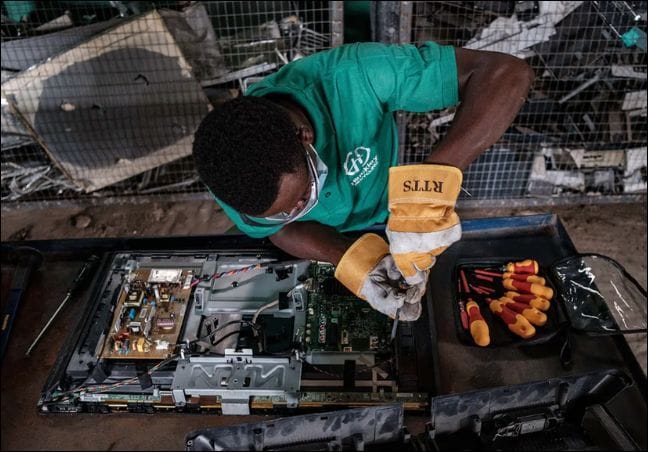- Circular Rising
- Posts
- This is the new funding playbook for e-waste companies
This is the new funding playbook for e-waste companies

From the newsletter
Hinckley E-Waste Recycling, a Nigerian startup, has secured funding from impact investors Goodwell Investments and Alitheia Capital to scale its operations. The investment will support the construction of the country’s first battery recycling plants, with a combined capacity to process up to 30,000 tonnes of electronic waste per year.
Access to funding remains a major hurdle for African circular startups, with many struggling to attract capital despite growing waste challenges and clear market potential.
Hinckley’s success offers key pointers on overcoming the hurdle: Focus on scale, integrate informal collectors, and align with industrial and environmental needs to unlock investor confidence and growth.
More details
Founded in 2017, Hinckley E-Waste Recycling Ltd is an award-winning Nigeria based recycler of electronic waste. The investment will be channelled through Goodwell Investments’ uMunthu II fund and used to finance the establishment of Nigeria’s first dedicated lithium ion and lead acid battery recycling plants, to be located in Ogun State in the south west of the country.
The investment aims to support the recycler to address the growing e-waste crisis in Nigeria, which is considered the largest producer of electronic waste in West Africa and the third largest in Africa after South Africa and Egypt.
Hinckley E-Waste Recycling’s recent equity investment marks more than just a growth milestone for a single Nigerian company. It represents a strategic turning point for Africa’s emerging circular economy. For early-stage startups across the continent, Hinckley offers a compelling case study in how to build investor confidence, scale responsibly and align profit with impact.
At its core, Hinckley’s success stems from an ability to match rising environmental urgency with industrial readiness. Across Africa, the demand for batteries is surging, driven by the adoption of electric mobility, the decentralisation of energy systems and the growth of solar powered technologies. But this green shift comes with a darker side: soaring volumes of hazardous battery waste.
Hinckley’s model does not simply collect and recycle. It positions the company as a key player in securing the raw materials needed for Africa’s own energy transition. This dual relevance to both environmental stewardship and industrial supply chains is a vital lesson for circular startups seeking to scale. This relevance was not lost on investors either. As Doubra Eghaghe of Alitheia Capital affirmed in a press statement, “Our investment in Hinckley is based on a compelling business case, anchored on the growing importance of e-waste recycling.”
Another key insight is Hinckley’s deliberate formalisation of the informal. Like many waste management startups on the continent, the company relies heavily on networks of local waste pickers. But rather than marginalise them, Hinckley integrates these collectors into its broader value chain. This not only strengthens supply but reinforces the company’s social impact credentials, making it more attractive to mission aligned funders such as Alitheia Capital and Goodwell Investments.
This was central to the investment rationale, according to Mr Eghaghe of Alitheia, “Hinckley’s potential to create meaningful social and environmental impact reflects the core ambitions of the uMunthu II fund. We are excited for the opportunity to work together in strengthening, scaling and literally building Hinckley’s vision for a cleaner, more inclusive future.”
The company also offers a roadmap for navigating Africa’s fragmented policy and pricing environment. With opaque and inconsistent pricing for recyclable materials, many startups face margin pressure and supply volatility. Hinckley addresses this by establishing direct offtake relationships with major electronics brands. Clients include Samsung, HP, Lumos and PZ Cuzzons, reducing reliance on middlemen. Other SMEs can learn from this by diversifying revenue, improving price transparency and capturing more value from what they collect.
Strategic partnerships beyond capital have also been crucial to Hinckley’s growth. The company’s expansion was not driven by funding alone but supported by a web of technical and ecosystem partnerships. Through donor backed programmes such as Ze-Gen and PURE, Hinckley replaced diesel generators with second life batteries, lowering its environmental footprint and reinforcing its circular commitments.
At the same time, transaction facilitation support from Manufacturing Africa helped structure and close the investment deal, highlighting how non-financial assistance can be as vital as capital. For other SMEs, the message is clear: accessing programme-based support and aligning with broader climate and energy agendas can boost both credibility and capacity.
However, corporate backing may have given Hinckley a crucial edge over many early-stage peers. Unlike most SMEs navigating Africa’s circular economy alone, Hinckley is linked to Hinckley Group Africa, a 27-year-old company with operational roots in Nigeria and the UK, and a background in information technology and training.
This affiliation likely boosted investor trust, offering credibility and access to technical expertise, support systems and supplier networks that smaller recyclers often lack. Nonetheless, the wider lessons remain highly relevant, particularly around strategic positioning, ecosystem alignment and preparedness for scale.
Our take
Hinckley’s deal shows that Africa’s circular economy doesn’t lack innovation, it lacks the kind of early growth capital and infrastructure funding that turns good ideas into scalable impact.
In an era where the circular economy is gaining global traction, but African solutions are often overlooked, Hinckley proves that local innovation can meet international standards. The challenge now is for other startups to translate this momentum into action, by designing for scale, embedding inclusion and making waste not just a burden, but a resource.
Most importantly, Hinckley’s new deal with the uMunthu II Fund signals investor confidence in a systems level solution to a crisis outpacing policy and infrastructure alike.